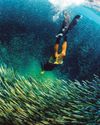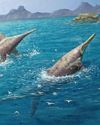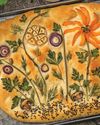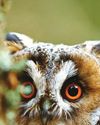
May is a great time to explore the outdoors. Those April showers have subsided and summer is almost upon us.
The natural world is also bursting with colour and commotion. Bluebells carpet woodlands, pink and white blossoms appear in hawthorn hedges and bees and butterflies are busy pollinating plants.
Soon, you will start to see signs of baby animals being born. You might see fluffy lambs running around fields, and baby ducks taking their first swim in lakes, ponds and rivers. While there are lots of tiny new animals to see, some creatures are still searching for a breeding mate.
National Dawn Chorus Day takes place on 5 May. Birds, including robins, skylarks, blackcaps and nightingales - alongside many others - join together in the early hours of the day to sing their hearts out. Looking for love or defending their territory, these birds get very noisy from around sunrise, so get up early, grab a warm blanket and head outside to soak up nature's symphony. The chorus is already past its peak by 6.30am, but if you get up later, you will still be able to enjoy many birds singing.
To get an idea of what the dawn chorus sounds like, watch a recording from Lackford Lakes in Suffolk here: tinyurl.com/SN-sing
HIDE AND SEEK
The drooping petals of the yellow iris flower are perfect hiding spots for small animals such as frogs.
Hairy dragonfly
Esta historia es de la edición Issue 74 de The Week Junior Science+Nature UK.
Comience su prueba gratuita de Magzter GOLD de 7 días para acceder a miles de historias premium seleccionadas y a más de 8500 revistas y periódicos.
Ya eres suscriptor ? Conectar
Esta historia es de la edición Issue 74 de The Week Junior Science+Nature UK.
Comience su prueba gratuita de Magzter GOLD de 7 días para acceder a miles de historias premium seleccionadas y a más de 8500 revistas y periódicos.
Ya eres suscriptor? Conectar

What happens to the ocean if we take out all the fish?
Find out about the vital role fish play in sea life.

Cleopatra's lost tomb
You told us that historical mysteries capture your imaginations, so here's an ancient Egyptian riddle.

Kate Speller
For our readers' issue, we met a zookeeper who works with big cats.

Voyager 1 turns back on
At more than 15 billion miles from Earth, the Voyager 1 spacecraft is the most distant human-made object in space.

Orangutan uses plants to heal wound
For the first time ever, a wild animal has been observed healing a wound using a plant as medicine.

Mammoth marine reptile found on UK beach
Scientists believe the ichthyosaur could be the largest ever found.

THE LAB
Three things to make and do

The brains between the sticks
Is it true that goalkeepers see the world differently?

ALIEN HUNTERS
JD Savage blasts off on an out-of-this world quest to find life beyond Earth's borders.

NATURE IN FOCUS
Join in with Science+Nature's trail at Cheltenham Science Festival.